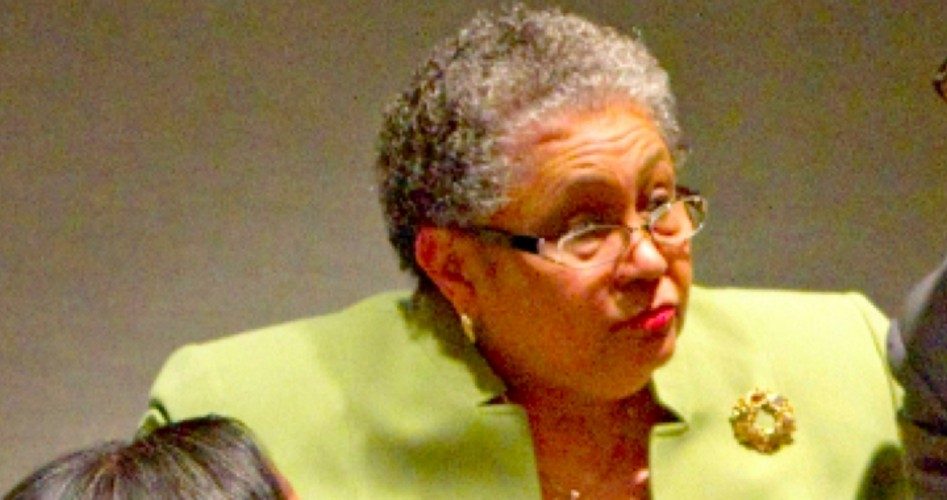
The former superintendent of Atlanta’s public schools was one of 35 district officials indicted March 29 on charges that they participated in a years-long conspiracy to cheat on federal standardized tests, both for personal financial gain and to demonstrate improvements in student achievement that did not actually exist.
Shortly after becoming the superintendent of Atlanta’s suffering public schools in 1999, Dr. Beverly Hall (shown) “established increasingly tough performance targets for every school that would become progressively more difficult to hit,” reported the Atlanta Journal-Constitution. “Her mantra: ‘No exceptions and no excuses.’”
Hall, district administrators, and even teachers were offered lucrative incentives to show that academic performance among students in the mostly poor, black school district was improving. According to a federal grand jury, the superintendent, district officials, and principals perpetrated a scheme that appeared to show the district was improving, got paid handsomely for it, and then lied in an attempt to cover their crimes when federal investigators began closing in on the fraud.
Reported the Journal-Constitution: “Hall inculcated an atmosphere that encouraged using any means necessary to achieve test-score targets, the indictment said, and then ‘publicly misrepresented the academic performance of schools throughout [Atlanta Public Schools].’ Pressuring subordinates to produce targeted scores, the indictment said, ‘created an environment where achieving the desired end result was more important than the students’ education.”
Richard Hyde, one of the key federal investigators who uncovered what has become the largest academic cheating scandal so far in the United States, called the conspiracy “nothing but pervasive and rank thuggery.” The 66-year-old Hall, who retired in 2011, faces as much as 45 years in prison if convicted. Other top-level district officials indicted include Millicent Few, the district’s human resources director; and school supervisors Sharon Davis-Williams, Tamara Cotman, and Michael Pitts. In addition, those charged in the scheme include seven principals, two assistant principals, 14 teachers, five testing coordinators, one instructional coach, and a school secretary. The charges include racketeering, theft, making false statements, and false swearing. “Authorities accused some educators of influencing witnesses by pressuring them to lie to investigators about cheating,” reported the Journal-Constitution.
The Atlanta newspaper noted that early in the conspiracy, Hall tried to weed out teachers who complained about cheating in the district. “When a teacher at C.W. Hill Elementary complained about cheating by a colleague in 2005, Hall suspended the accused educator for 20 days,” recalled the paper. “As for the whistle-blower, Hall fired her.”
The grand jury recalled one particularly troubling example of willful negligence on the part of the superintendent. In 2006, Hall was getting increasing reports about cheating at Parks Middle School, and complaints involving the school’s principal, Christopher Waller, about, among other problems, falsifying student records and pressuring teachers to change answers on students’ tests. According to the indictment, a private investigator hired by the district reported back to Hall that Waller had “coerced teachers to cheat” and “was threatening and intimidating teachers not to reveal information” relevant to an investigation against him.
But instead of taking action to stop Waller, the indictment recalled, Hall instead publicly praised the principal for the rapid boost in the test scores of Parks’ students. Waller was also approved for bonuses tied to the improvements. “But when investigators asked her about Waller in 2011,” reported the Journal-Constitution, “the indictment said, Hall denied receiving complaints involving the principal or meeting with the detective — willful lies, the grand jury alleged.”
The New York Times reported that among the first Atlanta school district employees to turn state’s evidence in the case was Jackie Parks, a third-grade teacher at Atlanta’s Venetian Hills Elementary School. In the fall of 2010, Parks admitted to federal investigator Richard Hyde “that she was one of seven teachers — nicknamed ‘the chosen’ — who sat in a locked windowless room every afternoon during the week of state testing, raising students’ scores by erasing wrong answers and making them right,” reported the Times. “She then agreed to wear a hidden electronic wire to school, and for weeks she secretly recorded the conversations of her fellow teachers for Mr. Hyde.” Those conversations helped to break open the case and lead to the indictments against Hall and others.
As for the incentives, which are at the basis of the conspiracy charges, Hall gave individual school principals, as well as teachers, lucrative bonuses if the school could demonstrate that it was meeting 70 percent of targeted improvements in student performance — improvements that were, in most cases, largely non-existent.
The indictment charged Hall with falsely qualifying herself for significant bonuses based on bogus improvements in district test scores for 2007, 2008, and 2009. In addition to her base salary, which exceeded $300,000 by 2009, Hall collected bonuses of more than $225,000 for those three years, and a total of about $580,000 in bonuses over a 10-year period.
While the indictment did not charge that Hall and her co-defendants orchestrated a specific scheme of cheating, fraud, and cover-up, there nonetheless existed an ongoing criminal conspiracy with Hall at the top, said District Attorney Paul Howard in announcing the indictment. “Because there is a single-minded purpose, and that purpose is to cheat to manipulate the grades, what we are alleging is that [Hall] was a full participant in that conspiracy,” he said. “Without her, the conspiracy could not have taken place.”
Through her attorney, Richard Deane, Dr. Hall has continued to deny any wrongdoing, something she has done since the investigation was first announced. “We note,” said Deane in a prepared statement, “that as far as has been disclosed, despite the thousands of interviews that were reportedly done by the governor’s investigators and others, not a single person reported that Dr. Hall participated in or directed them to cheat on the C.R.C.T.” — the federal Criterion-Referenced Competency Test.
Forbes magazine speculated that the scandal, in one of the nation’s largest public school districts, “must be a huge disappointment to Secretary of Education Arne Duncan, whose ‘Race to the Top’ initiative doles out roughly $4.35 billion to schools and districts based in large part on how their students perform on standardized tests.”
The business journal added that Hall’s indictment “must be especially galling to President Obama, who feted the former superintendent at the White House back in 2009 precisely because of what the Schools Superintendent Association termed Hall’s ‘leadership’ in turning ‘Atlanta into a model of urban school reform.’”
Without a doubt, the scandal casts additional doubt on the federal eduction bureaucracy and its decades-long campaign to lift the academic performance of the nation’s hopelessly corrupt big-city public school systems. As noted by the New York Times, in 2009 the American Association of School Administrators named Hall its Superintendent of the Year based on her success in lifting the standardized test performance of the mostly poor and black 52,000-student Atlanta school district to a level that was higher than some of the wealthier suburban Atlanta districts.
As now been reveled, those results were, for the most part, based on fraud.
Photo of Dr. Beverly Hall: AP Images


